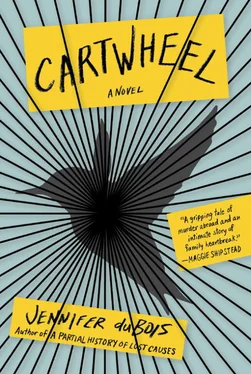“What histrionics?” said Lily. Her pupils were enormous from the weed and the dark.
“Please don’t insult my intelligence,” said Sebastien. He realized immediately that the “please” made it sound like a request, not a demand.
“I have no idea what you’re talking about.”
“We’re done here, aren’t we?” Sebastien hated, absolutely hated, what this new energy of hers was doing to him: rendering him silent, monosyllabic, ordinary. If he could have been angry with her for anything—which he couldn’t yet—it would have been for this.
“Sebastien.” Lily turned her head away from him—whether in bafflement or sadness or anger, he was not sure. “I don’t mind about you and Katy, you know.”
A new sense of doom was dawning in the back of Sebastien’s head, but he felt too stupid now to comprehend it. His tongue was thick and ungainly. “Me and Katy what?”
“I don’t mind. Really. I know it has nothing to do with us. I’m not possessive.”
Sebastien was trying very, very hard to understand, but the weed made it impossible to follow a sentence from its beginning to its end. Lily looked sad.
“But I do think that maybe we should probably spend less time together,” she said.
To this, Sebastien said nothing. He could think of absolutely nothing to say.
“I’m going to take a walk,” said Lily, standing up. “I need some air.”
“I’ll come with you.” Sebastien scrabbled upright. He was not at all sure, in that moment, how he might go about executing the physical act of walking, if Lily had assented. But he also knew that she would not.
“No,” she said. “I want to be alone. We’ll talk about it in the morning.”
“As you wish,” said Sebastien, and gave half a sloppy bow for aesthetics.
She was gone for a long while. Later Sebastien would try to remember exactly how long, but it was hard to say precisely; the weed had made his relationship to time somewhat suspect, and all the minutes she was gone felt longer and harder and more robust than they possibly could have been. He remembered that he stared out the window at the Carrizos’ house for a time. Across the yard, all the lights were off. Later, Sebastien would spend endless nights wishing he’d been watching the garden, wishing he’d been attentive to the shifting of any shadows that might have been moving there. But he’d spent so much time watching the house for its light that all he would ever remember of that night was its darkness.
Sebastien was never really sure if Lily ever came back. He dreamed of her all night—he dreamed that they spoke, he dreamed that they kissed, he dreamed of her returning, again and again and again. And somewhere in the sea of his dreaming, he thought that she actually did return, at some point, and lay beside him, at least for a while. But he could not be totally certain, because he went back to sleep very quickly. He wanted to be with the Lily who loved him.
In the morning, when Sebastien woke, she was gone. Golden bars of light illuminated the map on the wall—all the places he had either already gone or would never go. There was nowhere on that map that he hadn’t been yet but would one day see, he remembered thinking. In the bed next to him, the sheets were still slightly damp and sweet with that adolescent perfume that Lily wore. She was gone, and Sebastien thought—dramatically, implausibly—that he might never see her again.
But he did. She was back again that afternoon, running up the steps, her face sheet white except for a bright red spot on her cheek, and she was crying with a wild and ragged and frightening abandon, crying like she never cried afterward, crying like nobody else ever saw her cry, throughout the entire thing. Her hair was streaming all around her. And Sebastien stood on the stoop in terror thinking, What’s wrong, what’s wrong, my love, what’s wrong?
February
The next morning, a pair of police officers showed up at Sebastien’s door. After a surreal, hallucinatory trip to the store to buy a toothbrush, Lily and Sebastien had retreated back to his house. Lily had spent the night weeping and throwing up—sometimes simultaneously—while Sebastien brought offerings that grew increasingly outlandish over the hours: water, then toast, then some restorative fried eggs at four a.m., then some fortifying vodka at seven. She refused all of it. At some point Sebastien slept a bit, he thought—at any rate he collapsed on one of the sofas for a while—but one channel of his consciousness seemed to remain on all night, and when a knock on the door finally came the next morning, he did not really feel that it had woken him up.
Sebastien went to the kitchen sink and ran a wet comb through his hair. He was still wearing yesterday’s clothes. Another knock came, more aggressive than the first. He went to the bathroom and opened the door, where Lily was sitting with her back against the porcelain flank of the bathtub. She looked up. Her face was clayey and blanched, like she was a victim of internal hemorrhage. “Is someone here?” she said.
Sebastien extended his hand to her. “Come on,” he said.
They opened the door to a pair of police officers, young and vigorously well groomed, and Sebastien made an elaborate show of offering to make them some coffee. This was a bluff—he did not have any coffee—but the officers weren’t interested, anyway. They told Sebastien and Lily that they’d like to take them down to the station. They wanted, they said, to have a conversation.
In the car, Sebastien was relieved that the police did not make Lily or him wear handcuffs—Sebastien was given to understand that agents of law enforcement were always on the hunt for opportunities to practice needless barbarism. Having his hands free meant that he could rest one of them lightly on Lily’s—not quite holding it, just floating on it—in a gesture that he hoped seemed present, not proprietary. He had to assume that they were still broken up.
The word “conversation” had made Sebastien think that he and Lily would be speaking together with the police, but this, it seemed, was not the case. They were split up almost immediately: Sebastien led down one dark hallway and Lily down another, into conversations that were separate—and, as it turned out, very, very long.
Sebastien was interviewed first by one of the officers who had come to the door. The questions he posed were straightforward, and for once Sebastien didn’t embellish his answers—even though, after years of conducting all conversations as though they were being recorded, he knew that this one actually was.
“How did you spend the evening?” asked the officer.
“Watching a movie,” said Sebastien.
“All evening?”
“Mostly.”
“What else?”
Sebastien did not know what Lily was saying to her interrogators, or if she was saying anything at all, though he almost felt that he’d be able to detect her answers—that he’d be able to sense them through some kind of magnetic shifting out in the universe—if only the cop would stop talking to him for a moment and just let him pay attention.
“We talked,” said Sebastien. He felt a poisonous sense of decay alongside a vile clenching feeling. He realized that he’d been gearing up to lie long before he knew that he would have to.
“You were together all evening?”
I am going for a walk , Lily had said. It would be hard to make someone believe that he had not asked where, but truly, he had not. The only thing that had mattered then was her impending departure; the destination or even the duration of her leaving seemed, in that moment, beside the point. Through heavy marijuana-befogged lids, Sebastien had watched her walk out the door. And somewhere in that moment—or somewhere a bit before it, or a bit after—Sebastien had felt all causality in the universe collapse. The only thing that had seemed thinkable then was staring at the blue menu screen of the DVD player—it was transfixing, bewitching. He’d felt himself drifting ominously close to the ceiling; he had actually tugged at the bedspread to keep himself from hitting it. He’d thought he might be dying; he’d reminded himself he was not. He’d felt a coldness billowing up from somewhere deep inside him, like a vent blowing caustic air from a subway, or a spring bleeding water from some vast subterranean aquifer, or an oil rig spewing its cobalt bile from the earth. He had lingered on each image as it came to him, forgetting for long moments what feeling he was trying to figuratively capture. But then the vicious internal chill would remind him, and he’d fear that he was learning something about himself—something terrible, something that he could never unlearn.
Читать дальше












